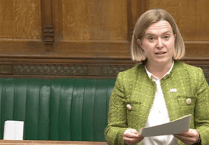The owners of an iconic Devon beachfront restaurant are expecting their business rate bill to go up in spite of measures in the Budget aimed at protecting hospitality.
Mark Goodey, who owns The Winking Prawn in Salcombe with Jane Tyler, said that even though there were measures outlined by the chancellor to protect businesses like his from the rate hikes, that early estimates suggested he’d be paying more anyway.
“I think our rateable value has gone up, and also, rates were subsidised by 75 per cent previously, and then only 40 per cent, so I think our business rates bill will go up.”
The Budget included a lower level of business rates for both small and standard retail, hospitality and leisure (RHL) businesses.
That means their so-called multiplier – a metric used to work out bills – will be 5p cheaper than equivalent businesses in other sectors.
Small RHL businesses will, therefore, have a multiplier of 38.2p compared to 43.2p for small businesses in other sectors, and standard RHL businesses will have a multiplier of 43p compared to 48p for peers in other industries.
But the business rates calculation is complicated by a revaluation, which will reassess the notional value of business premises.
The Budget papers suggest over half of ratepayers will see no bill increase, and 23 per cent will see bills go down.
For those seeing an increase, it pointed to its £4.3 billion support package over the next three years, including a £500 million Supporting Small Business scheme, and £1.3 billion for businesses who were eligible for retail, hospitality and leisure relief.
However, the Budget does acknowledge that for businesses losing some or all of their small business rates relief or rural relief will be capped at the higher of £800 or the relevant new level of relief cap.
That aspect appears to support Mr Goodey’s fear about rising business rates for The Winking Prawn, which was recently featured in Hollywood hit, The Roses, featuring Olivia Coleman and Benedict Cumberbatch.
Andrew Ireland, principal at Devon-based chartered surveyors Ireland Weller, said an issue with the business rates system related to difficulties in appealing, as well as fears from business owners of enhanced scrutiny from the taxman if they do.
“From a surveyor’s point of view, the most frustrating thing is that the Valuation Office Agency won’t permit you to appeal a rateable value unless you think there is a more than 20 per cent error,” he said.
“And in order to make an appeal, you have to provide them with a tax code, which allows them to call up your tax data and see with a bird’s-eye view what you’re doing.”
He added that this meant businesses could “spend thousands” trying to challenge a business rates bill, but then not succeed, and also instigate analysis from tax authorities about previous tax returns.
“I’ve got clients who are very nervous about making an appeal, because you have to input your unique tax code, and people are suspicious of that,” he added.
Mr Goodey added that other measures in the Budget weren’t necessarily supportive of businesses like his in such locations.
“I think the push towards apprenticeships is to support those people who will be the government’s core voter,” he said.
“Apprenticeships are difficult here as the work is seasonal, and employing someone for 12 months of the year isn’t easy.”
Speaking to the Local Democracy Reporting Service at a South Hams Chamber meeting, Mr Goodey’s reservations about the Budget were echoed by some others present.
The Chamber’s chair, Samantha Dennis, who is also a Conservative councillor for the Salcombe and Thurlestone ward on South Hams District Council, said “there was a lot of uncertainty and we still have that now”.
“That’s not good for businesses,” she said.
“One of our members said the housing market was stagnant and that the Budget would do nothing to change that.”
On the move by chancellor Rachel Reeves to implement a so-called ‘mansion tax’ from 2028, which would see properties valued above £2 million hit with an additional £2,500 council tax charge, rising to £7,500 for homes valued at £5 million plus,
Ms Dennis feared even if that did raise lots of cash, it wasn’t clear where it would be spent.
“It’s completely unclear whether we will see that money locally or whether it will just be another administrative burden for councils,” she said.
Adding: “Where is the money going to go? Will the collection of it just be another job for the council to do, but then the money only benefiting other areas.”
The Budget documents state that local authorities will collect the charges on behalf of central government and will be “fully compensated for the additional costs of administering this new tax”.
“Revenue will be used to support funding for local services, with further consideration through the next spending review in 2027,” the Budget papers add.
“The government will consult on detailed implementation of the HVCTS in the new year, including to determine who might need additional support to pay the charge and how to deliver it.”
-addressing-members-at-a-post-Budget-event-(Image-co.jpeg?width=752&height=500&crop=752:500)




Comments
This article has no comments yet. Be the first to leave a comment.